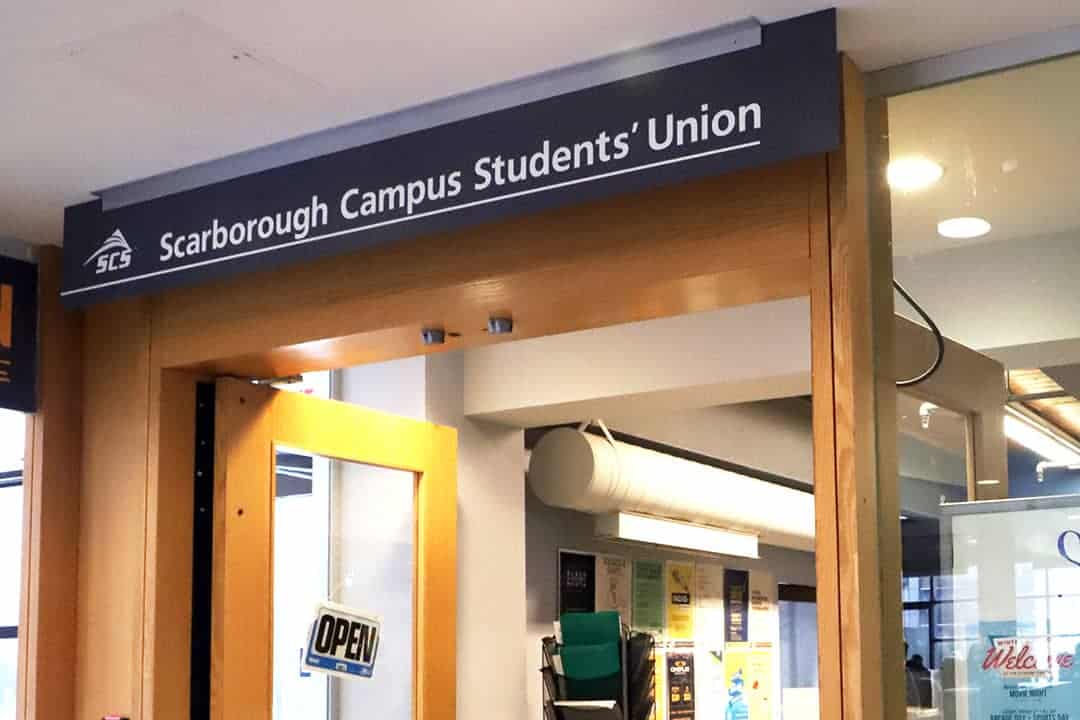On January 31, the Scarborough Campus Students’ Union (SCSU) held a Board of Directors (BOD) meeting. At the meeting, the board approved Michael Sobowale’s resignation from his role as president. Sobowale turned in his resignation to the SCSU executive director on January 23.
The BOD also approved increases to levy fees and announced the completion of their new arcade space.
President resignation
Alice Wu, speaker of the SCSU BOD, announced Sobowale’s resignation, which the board unanimously approved.
Sobowale submitted his resignation letter to the SCSU’s executive director on January 23. In it, he cited “personal circumstances” as one of the reasons for his resignation. At the BOD, SCSU Vice-President External Thai Dillon Higashihara said that Sobowale has requested privacy at this time.
Higashihara said that, to fill the vacant role, the SCSU will release the job posting for the position of president shortly in accordance with SCSU bylaws. Students will have 20 days to apply once the posting is up. As of February 5, the posting has not been published.
“We encourage any student who’s qualified and meets the requirements under our bylaws to apply,” Higashihara said at the meeting. After students submit their candidacies, the SCSU’s Executive Committee will conduct interviews and select up to two candidates to submit to the board for election. SCSU Vice-President Public Academics & University Affairs Amrith David will assume the role of president until a new president is elected, in accordance with SCSU bylaws.
Sobowale is a fifth-year international student from Nigeria, and he was the first international student to serve as president of the SCSU.
In the year prior to being elected 2022–2023 president of the union, Sobowale served as the SCSU’s vice-president campus life. Before that, he served as the SCSU’s Frosh orientation coordinator for two years and volunteered with the SCSU’s food centre team and street team.
In his campaign for president, Sobowale pledged to work to improve communication between the union and its membership, support international students, and help first-year students transition to university more smoothly. He was the only candidate to run for president in the elections for the 2022–2023 term.
Levy fee increases
At the meeting, Wu presented the levy fee increases for the 2023–2024 academic year. SCSU Vice-President Operations Mathooshan Manoharan explained that the union increases student fees in line with inflation, measured using the provincial consumer price index (CPI). Currently, provincial inflation hovers around six per cent according to the CPI.
The SCSU Student Society levy fee will increase from $29.43 to $31.20 per semester for full-time students and $1.82 to $1.93 for part-time students.
The Student Centre levy fee will increase from $43.85 to $46.48 per semester for full-time students and $13.13 to $13.92 for part-time students.
The Canadian Federation of Students (CFS) levy fee will increase from $8.79 to $9.34 per semester for all undergraduate students. “The Canadian Federation of Students fee follows the national CPI increase, which sits at 6.3 per cent,” Manoharan explained. The CFS is a university and college student advocacy organization that addresses student concerns to federal and provincial governments.
The board unanimously approved all levy increases.
Executive updates
At the BOD meeting, SCSU executives updated the board on the union’s new services and advocacy efforts.
Manoharan announced the completion of the SCSU’s new arcade space near 1265 Bistro. The space features table tennis, air hockey, billiards, and foosball, among other entertainment amenities.
SCSU Vice-President Equity Yumna Abdelhameed also announced that students can now apply for the SCSU’s transit grant through the union’s website. With support from the UTSC’s Office of Student Experience and Wellbeing, the grant aims to improve students’ access to transportation. Applicants may receive up to $200. Previously, at the SCSU’s Annual General Meeting in November 2022, Abdelhameed said that applicants receive up to $500.
Meanwhile, Higashihara is working to implement the Universal Transit Pass (U-Pass) at UTSC. The U-Pass is a transit card that allows students unlimited fare-free rides on local transit systems. At UTM, students are automatically charged a U-Pass levy fee, which allows them to ride fare-free on MiWay, Mississauga’s transit system.
Higashihara said implementing the U-Pass at UTM is “much easier” than at UTSC. “There are various transportation systems funnelling into UTSC, whether it be TTC, Durham, GO, or York,” he said. “It’s a huge challenge to amalgamate all these public transit systems into a cohesive system.” He said that the SCSU is working with the U of T administration to meet with Metrolinx and discuss implementing a U-Pass at UTSC.
The Varsity has reached out to Sobowale for comment.
Editor’s note (February 5): This article was originally a breaking news article. It has been updated to add details from the board meeting.


